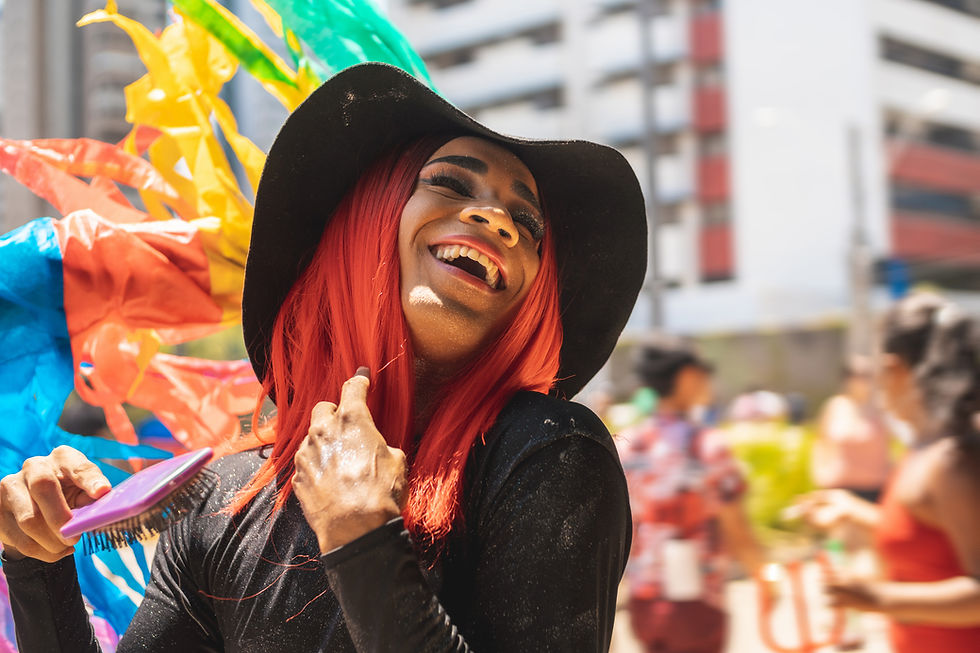Being Black and queer is a unique and multifaceted experience that intertwines the challenges and joys of two vibrant identities. It brings strength and resilience that comes with its struggles. Let’s explore what it means to be Black and queer and dive into the complexities.
The Intersection of Identities with Black and Queer
At the intersection of your Black and queer identities lies a powerful convergence of culture, history, and community. Both identities are rich with traditions, stories, and resilience. However, navigating life at this intersection can be challenging due to compounded discrimination from both racism and homophobia. This duality often requires a unique form of strength and resilience.
Navigating Racism and Homophobia
You might face racism within the broader LGBTQ+ community and homophobia within the Black community. This can create a feeling of not fully belonging in either space. For instance, you might feel excluded from predominantly white gay spaces where your race sets you apart. Conversely, you might face rejection in Black communities where your sexuality is not accepted. This double marginalization can lead to feelings of isolation and alienation.
Finding or creating inclusive communities that celebrate both your Black and queer identities can provide a sense of belonging. Online forums, local support groups, and social media communities can offer support and connection.

Here are some practical steps you can take:
Join Online Communities: Platforms like Reddit, Facebook, and Instagram have groups specifically for Black queer individuals. These spaces can provide support, advice, and friendship.
Attend Local Support Groups: Look for LGBTQ+ centers or organizations in your area that offer support groups for people of color. These groups can provide a safe space to share your experiences and connect with others who understand your journey.
Engage with National Organizations: Organizations like the National Black Justice Coalition and the Audre Lorde Project work to create inclusive spaces and advocate for the rights of Black queer individuals. They offer resources, events, and support networks to help you feel connected and empowered.
The Importance of Representation
Representation matters. Seeing yourself reflected in media, politics, and community leaders is vital for self-esteem and identity formation. Unfortunately, Black queer individuals are often underrepresented or misrepresented. Positive and authentic representation can validate your experiences and foster a sense of pride.

Supporting and elevating the voices of Black queer individuals is crucial.
Here are some ways you can contribute to this effort:
Consume Diverse Media: Seek out and support books, movies, music, and art created by Black queer artists. Their stories and perspectives can enrich your understanding and provide a sense of representation.
Advocate for Inclusive Representation: Use your voice to call for more inclusive representation in mainstream media. Write to media outlets, support campaigns that push for diversity, and share content that accurately represents Black queer experiences.
Celebrate Role Models: Recognize and celebrate Black queer figures who are making a difference. Figures like writer and activist James Baldwin, actress Laverne Cox, and politician Lori Lightfoot can serve as powerful role models and sources of inspiration.
The compounded stress of racism and homophobia can take a toll on your mental health. You may face higher rates of anxiety, depression, and other mental health issues due to these intersecting pressures. Access to culturally competent mental health care is essential for your healing and well-being.

Finding a therapist who understands and respects both your racial and sexual identities can make a significant difference.
Here’s how to find the right support:
Look for Culturally Competent Therapists: Seek out therapists who specialize in or have experience with LGBTQ+ and racial issues. Directories like Therapy for Black Girls or the National Queer and Trans Therapists of Color Network can help you find a suitable therapist.
Book your therapy session by emailing us at contact@gabbycaresofsouthfl.com or call us at 786-490-5988.
Join Supportive Communities: Therapy doesn’t always have to be one-on-one. Group therapy and peer support groups can also be valuable resources. These spaces can provide communal support and shared experiences that can be incredibly healing.
Amidst the challenges, there is also immense joy and resilience within the Black queer community. Celebrating your cultural heritage, forming deep and supportive relationships, and finding joy in self-expression are vital parts of your experience. These moments of joy and resilience are acts of resistance against a world that often seeks to diminish them.
Embrace and celebrate your moments of joy and resilience.
Here’s how you can make joy a central part of your life:
Engage in Cultural Celebrations: Participate in events celebrating your heritage and identity, such as Pride events, cultural festivals, and community gatherings. These events can affirm your identity and provide a sense of belonging.
Express Yourself Creatively: Find outlets for self-expression through art, music, dance, or writing. Creativity can be a powerful way to process emotions and celebrate your unique perspective.
Build Supportive Relationships: Surround yourself with people who affirm and celebrate your identity. Deep, supportive relationships can provide a sense of safety and joy.
Practice Self-Care: Make time for activities that bring you peace and happiness. Whether it’s a quiet evening with a good book, a nature walk, or a hobby you love, self-care is essential for maintaining your mental health and well-being.

It is being Black and queer means navigating a world that often fails to understand or accept your intersecting identities fully. However, it also means embodying a rich tapestry of culture, history, and resilience. By finding inclusive communities, advocating for representation, seeking supportive therapy, and celebrating moments of joy, you can thrive.
Remember, you are not alone on this journey. There is a community that sees you, supports you, and celebrates you for all that you are. Embrace your identity with pride and know that your experiences and voice are valuable and needed in this world.


Comments